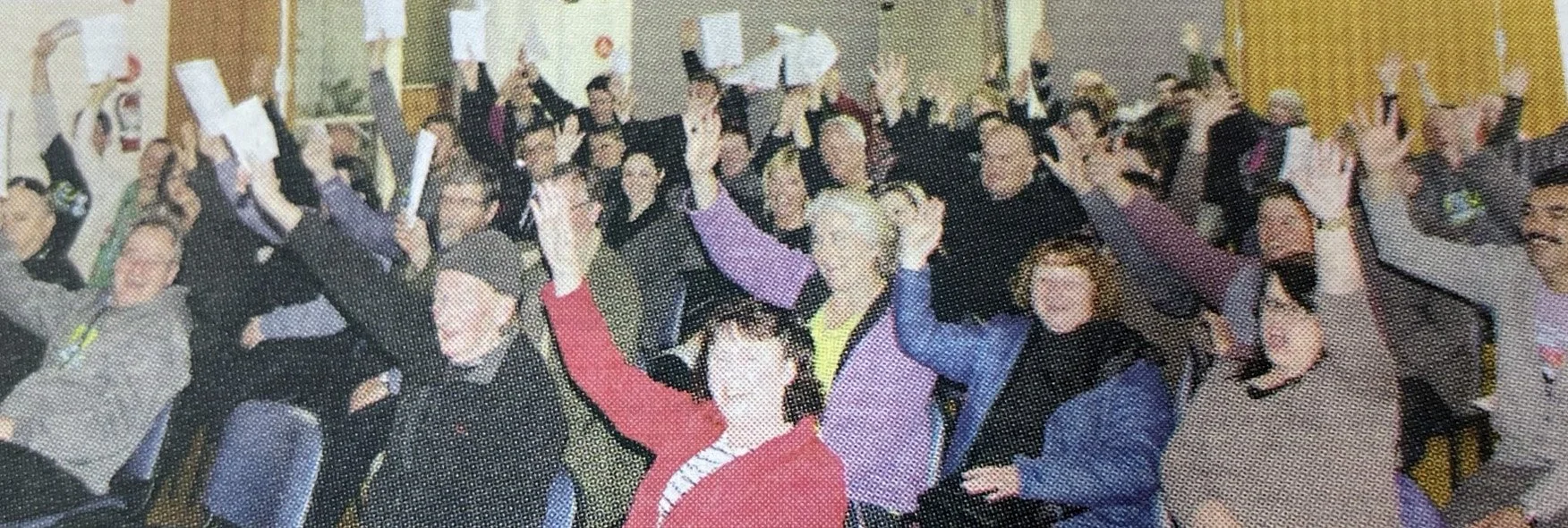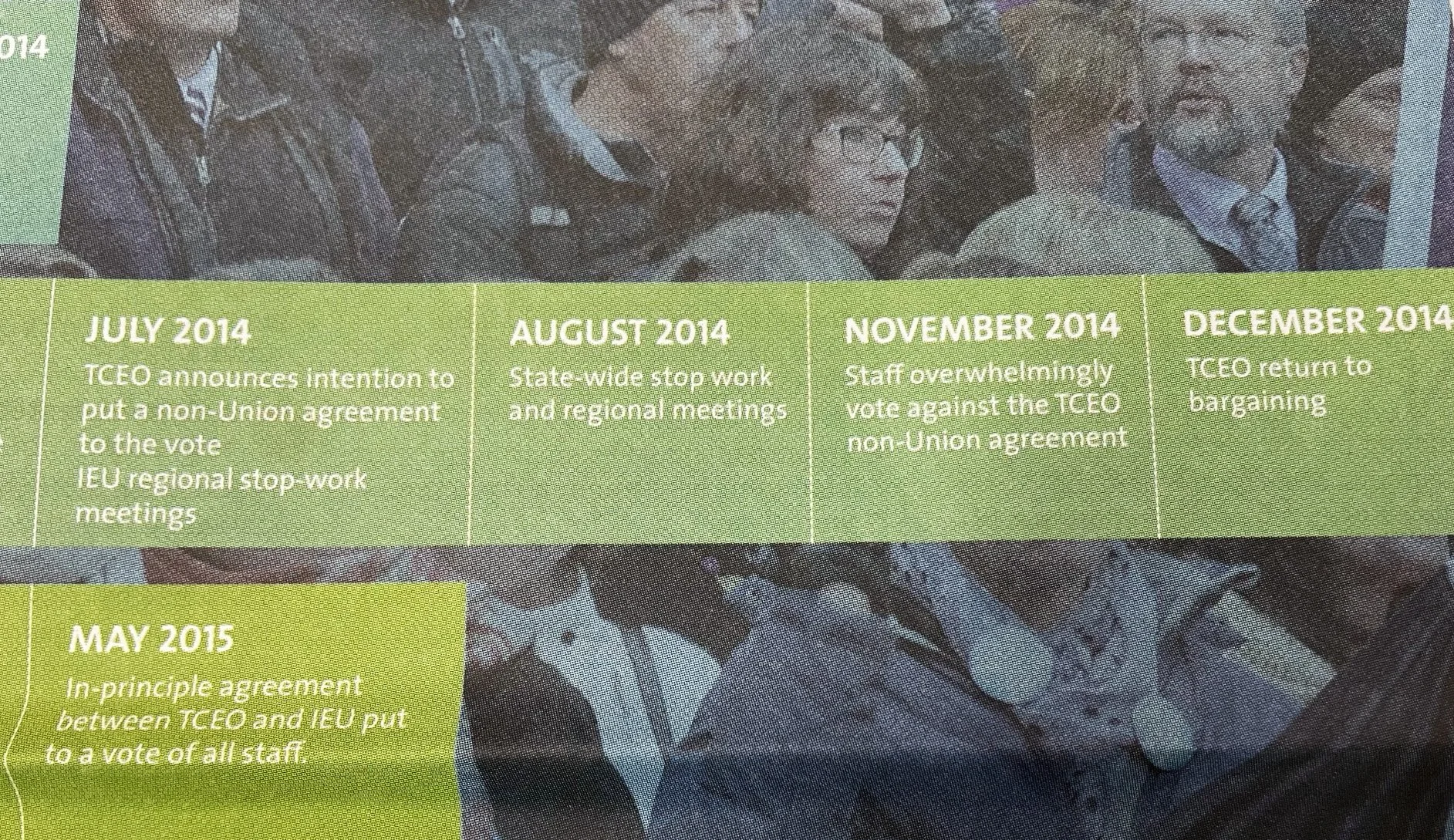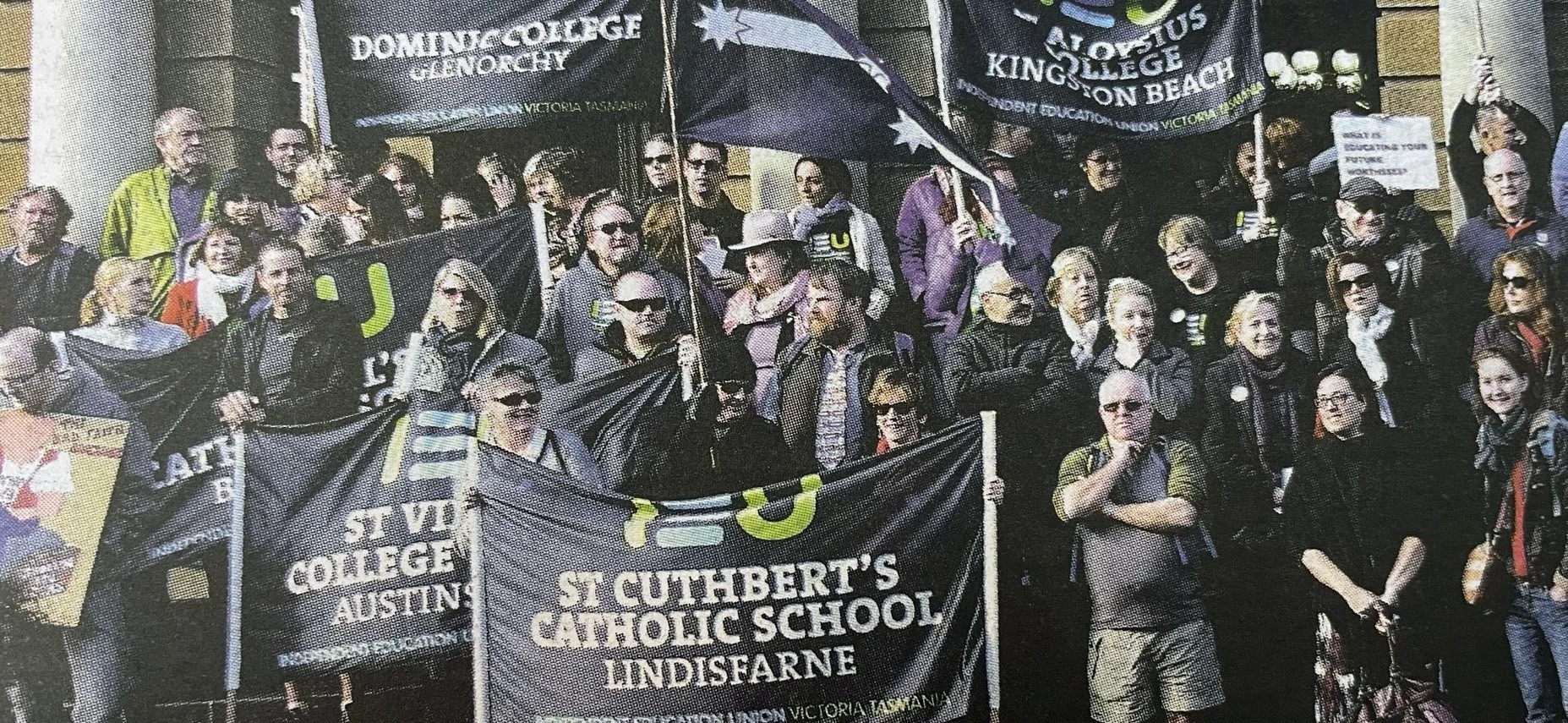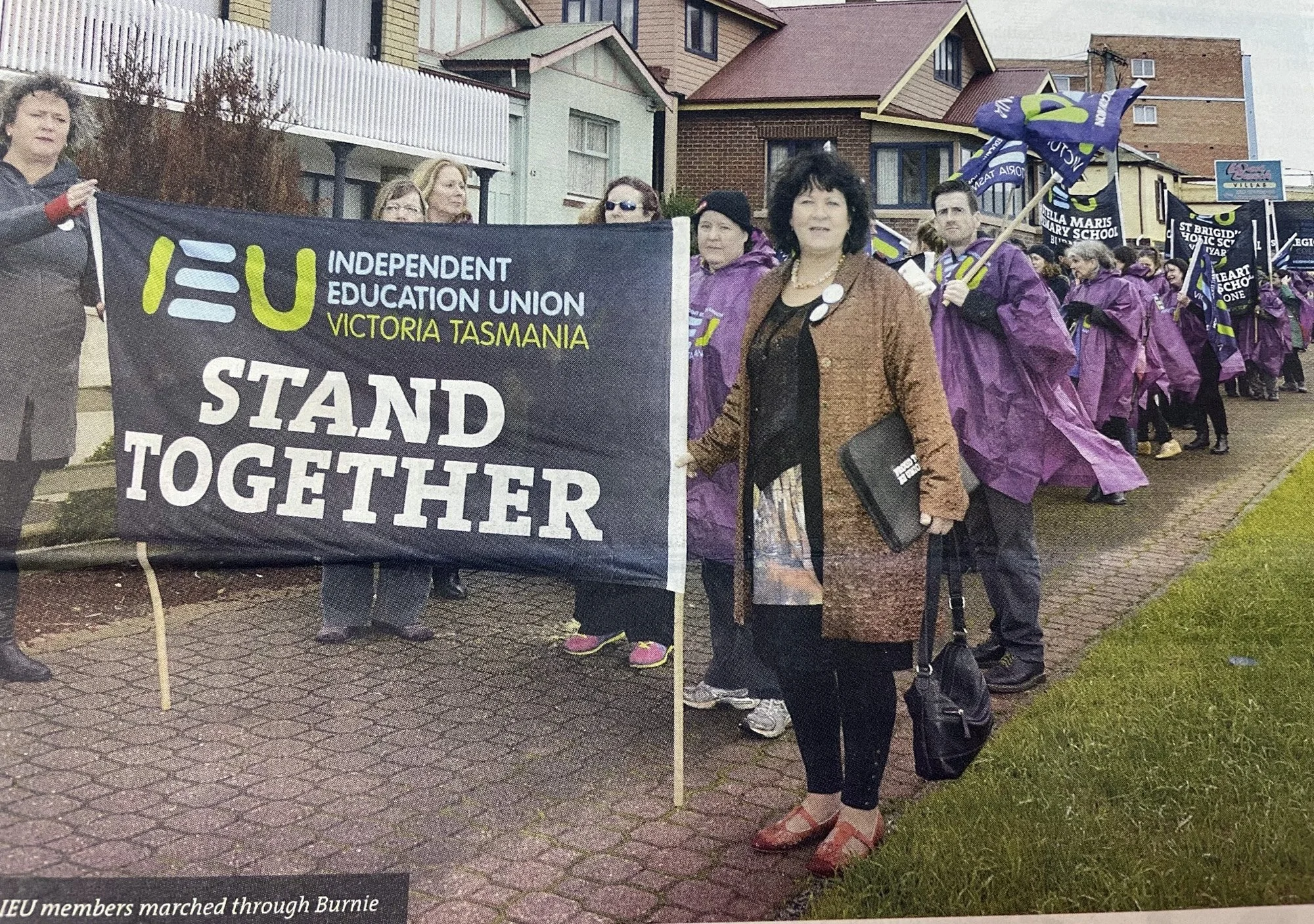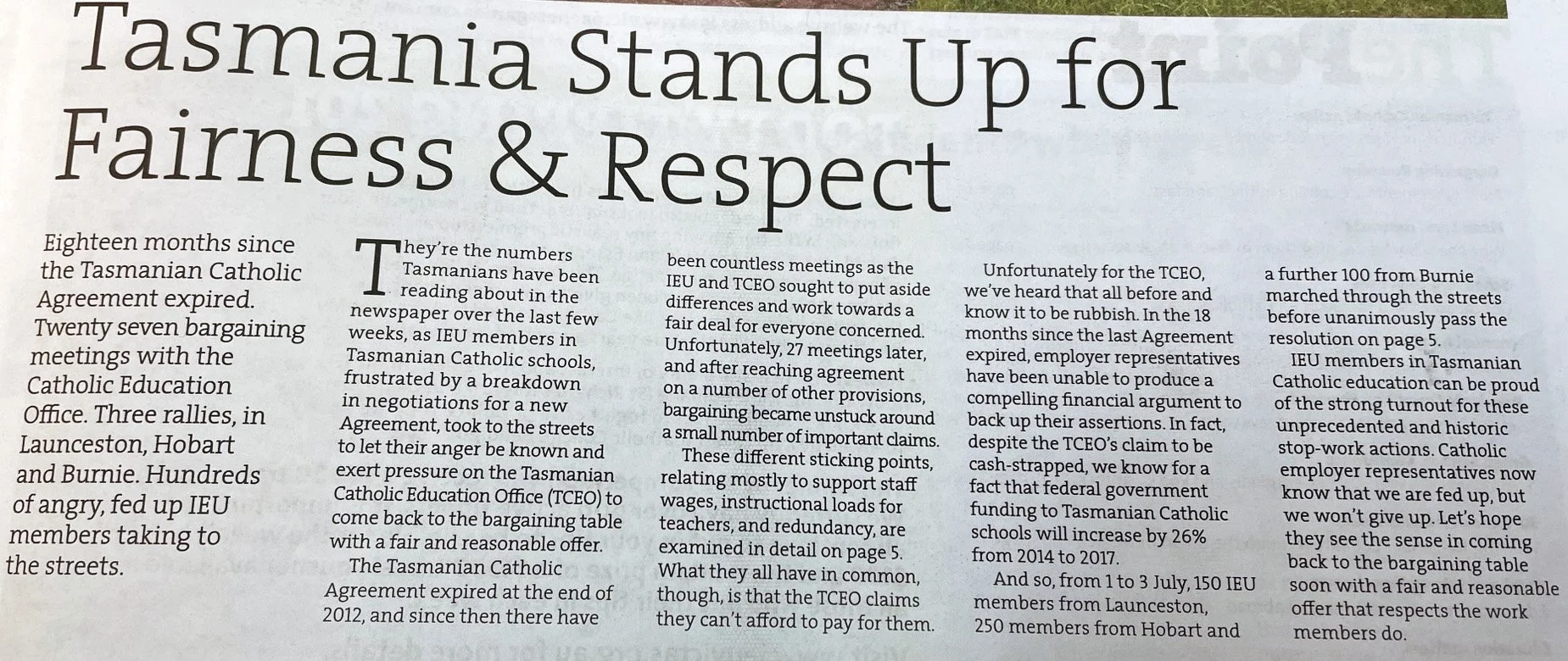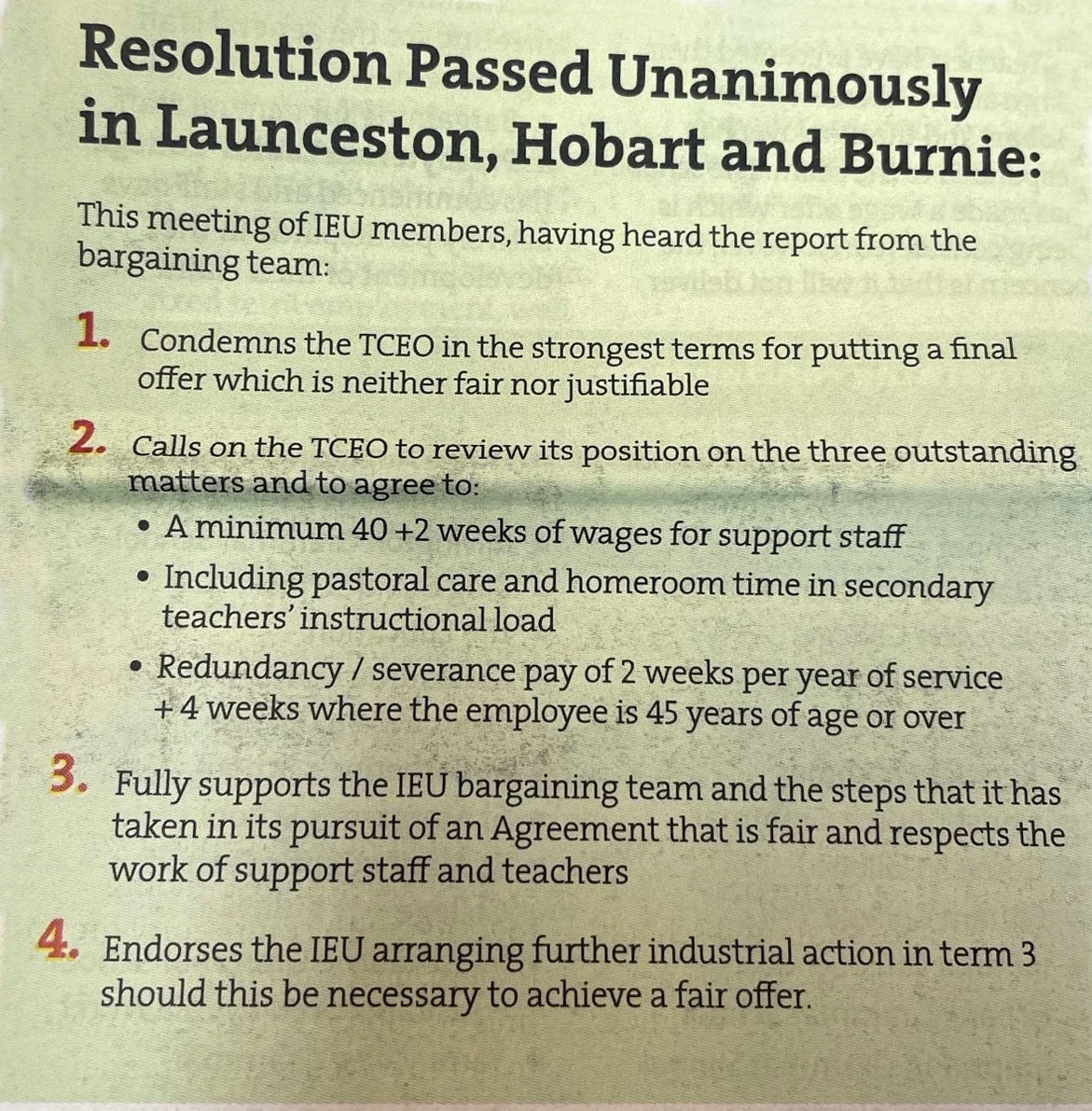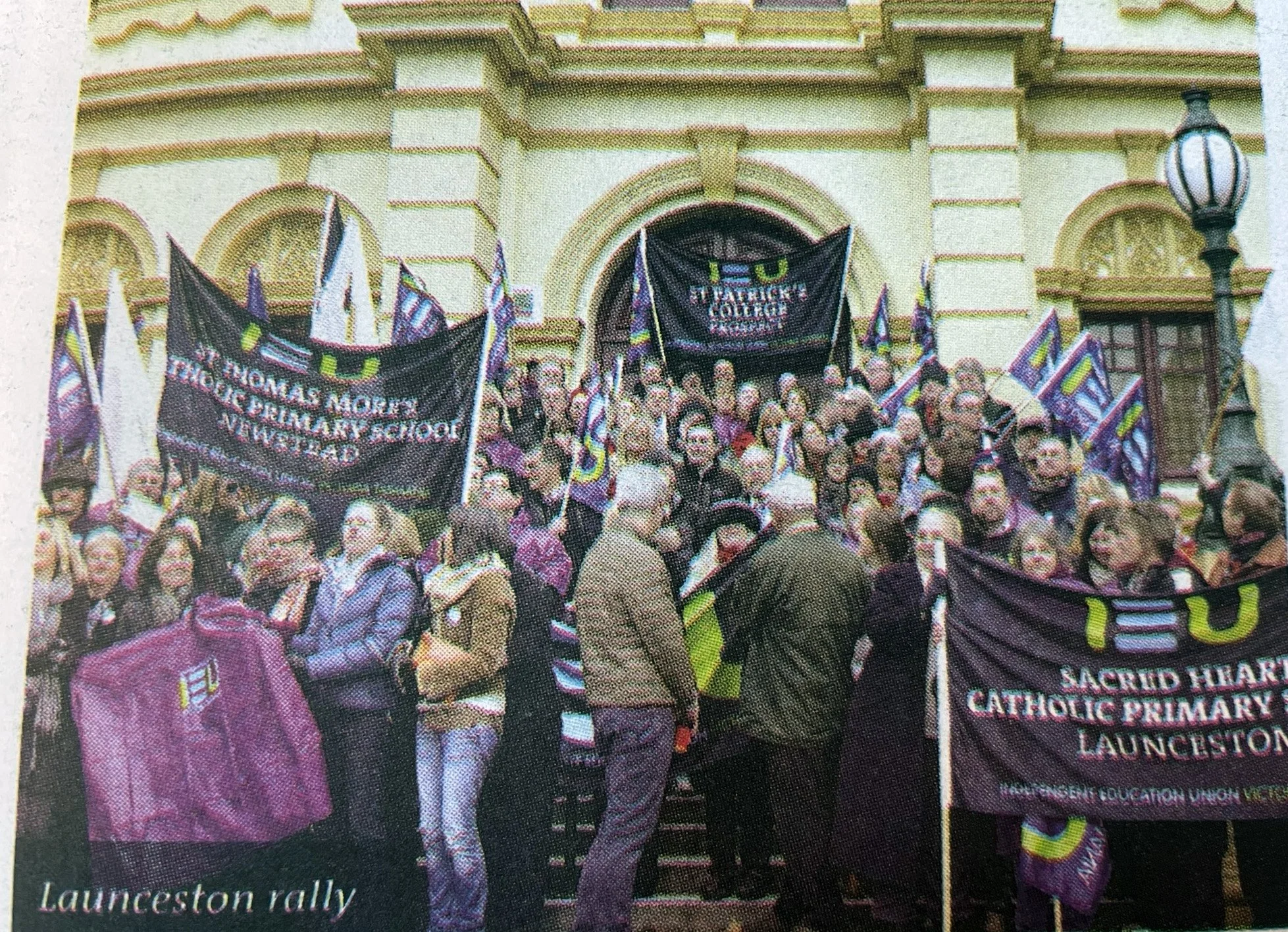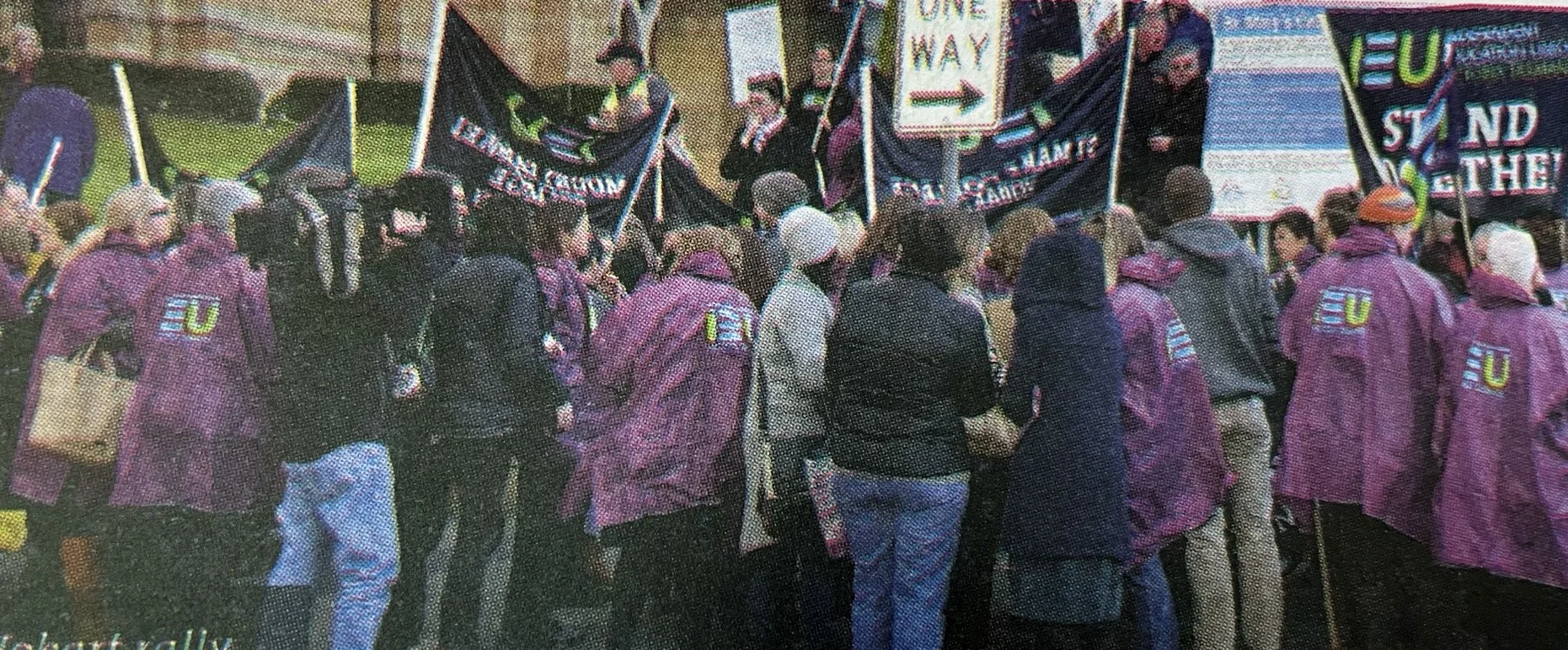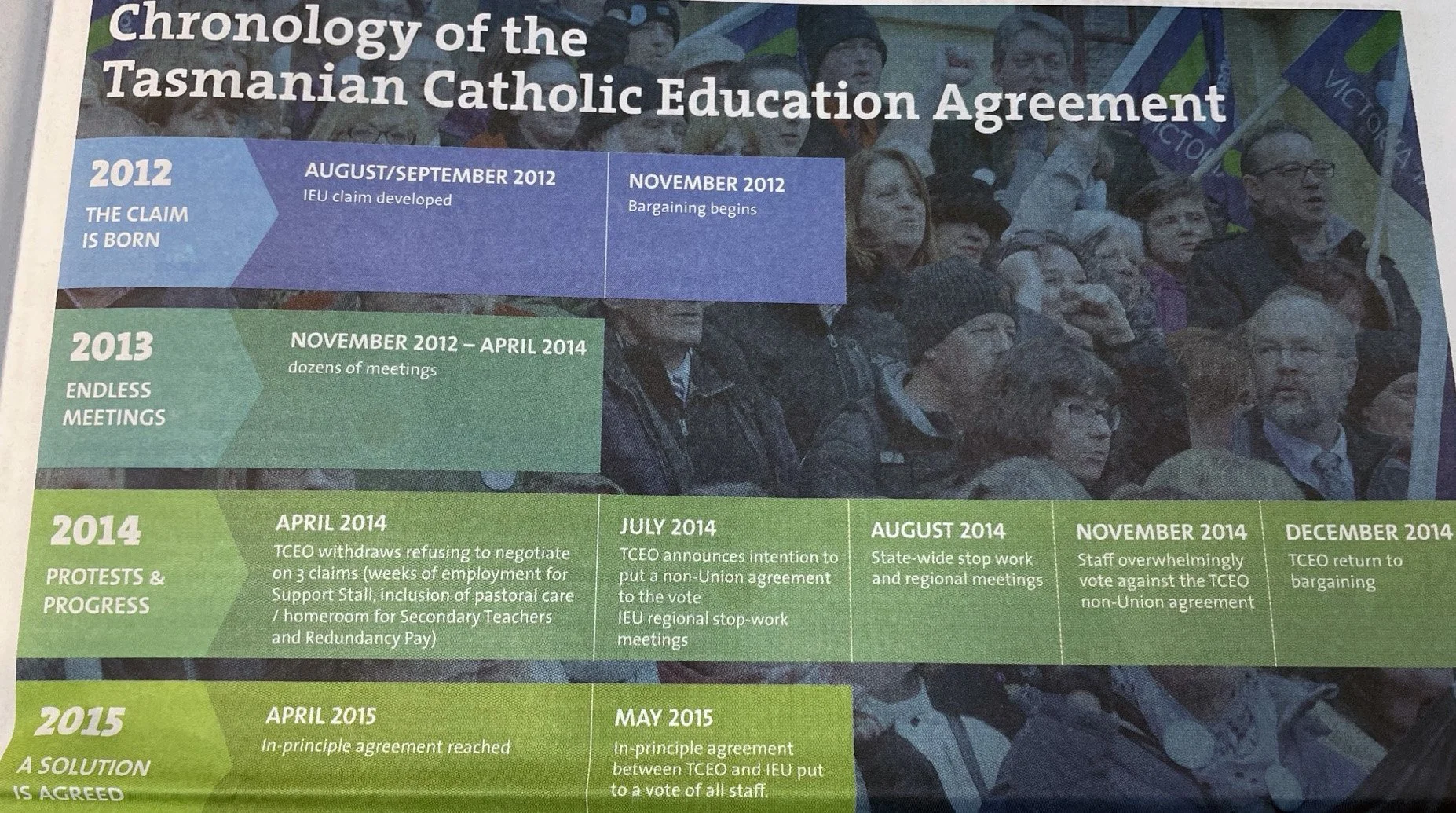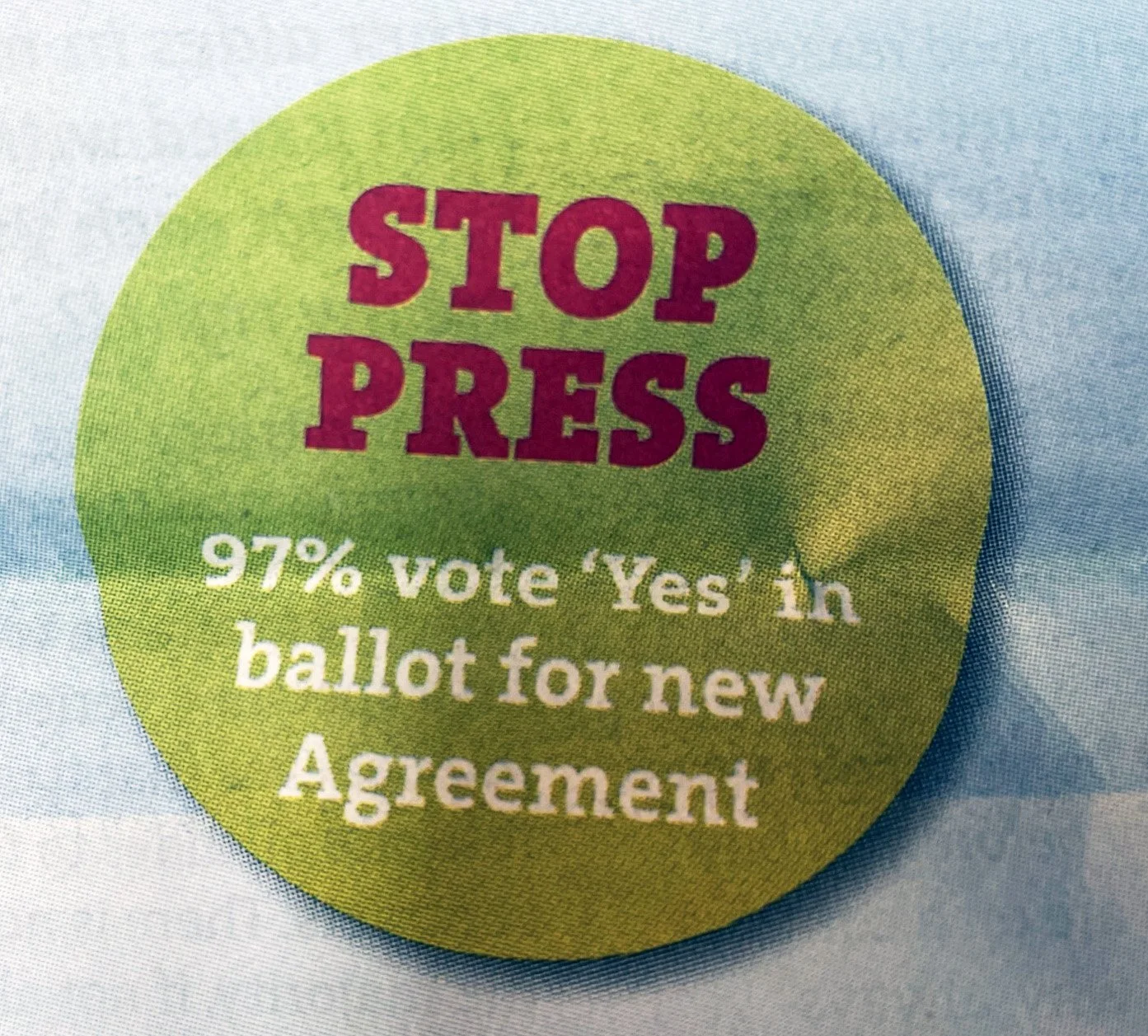‘Fed up but not giving up’: The first IEU Tasmania industrial action in 2014
In July and August 2014, Tasmanian IEU members rugged up for rallies in the chilly winter streets of Launceston, Hobart, and Burnie, after becoming frustrated by a breakdown in negotiations for a new Agreement.
‘Eighteen months since the Tasmanian Catholic Agreement expired. Twenty-seven bargaining meetings with the Tasmanian Catholic Education Office (TCEO). Three rallies. Hundreds of angry, fed-up IEU members,’ The Point reported.
It’s eerie how similar that scenario was to 2024, prior to agreement being reached. This time around it ended up being nearly three years since the Agreement expired, and there were nearly as many meetings dodged or cancelled by Tasmanian Catholic employers as held.
The actions a decade ago were taken to exert pressure on the Tasmanian Catholic Education Office to ‘come back to the bargaining table with a fair and reasonable offer’. The Agreement had expired in 2012, and bargaining came unstuck around ‘a small number of important claims’ – pastoral care time being included in the teaching load for teachers; income and employment security for support staff; and fair redundancy provisions. The TCEO claimed they couldn’t afford to pay for these.
‘Unfortunately for the TCEO, we’ve heard that all before and know it to be rubbish,’ The Point stated. The TCEO had not produced a ‘compelling financial argument to back up their assertions’ and was about to receive a 26% rise in funding from the federal government.
Former IEU Victoria Tasmania Deputy Secretary Loretta Cotter recalls the TCEO being ‘totally ineffectual’ as negotiators.
‘They took ages to respond to draft clauses, and their own claim was ridiculous. They trotted out the same tired line about not having enough money, that their last offer was their best offer, and that they would take their own Agreement out to staff. And so, the fun began….’
Industrial action, July, August 2014
The 24 hour stop-work action on 7 August 2014, involving hundreds of workers, was the first whole-day action taken by the newly amalgamated IEU Victoria Tasmania. It was described as ‘an outstanding collegial outcome’. It followed three four-hour stop-work meetings in July. The union acted after the TCEO bargaining team refused to budge on the three outstanding issues, or even to prepare properly for discussing them at bargaining meetings.
Loretta’s abiding memory of the actions is of ‘the courage of members to take industrial action’. ‘The first morning of action in Launceston was a typically very cold morning. We were unsure how many members would turn up, but suddenly we moved from a handful to a crowd that marched down the main streets. I remember how proud I felt of our membership.’
Rallies were held twice in Burnie, Launceston and Hobart, with hundreds of members walking the streets, raising flags and carrying banners to further amplify a cause already reaching Tasmanian newspapers and TV screens. The union featured on Tasmanian nightly news broadcasts three nights in a week.
At the time, Loretta said Tasmanian members had an ‘unprecedented opportunity to bring home to their employer the reality of their working lives’.
‘The TCEO’s refusal to guarantee secure employment for the lowest-paid staff in schools has outraged members and non-members alike…’
After taking to the streets, and hearing a report from the bargaining team, the gathered members unanimously passed a resolution which condemned the TCEO ‘in the strongest terms’ for putting a final offer which was ‘neither fair nor justifiable’. It called for action on the three outstanding matters and offered full support for the bargaining team ‘and the steps that it has taken in its pursuit of an Agreement that is fair and respects the work of support staff and teachers’.
The Point reported: ‘IEU members in Tasmanian Catholic education can be proud of the strong turnout for these unprecedented and historic stop-work actions. Catholic employer representatives now know that we are fed up, but we won’t give up.’
The campaign continued throughout 2014, with the union urging Tasmanians to stay strong and vote no to the TCEO ‘Agreement’ sent out in October. The TCEO received a gigantic pie in the face from that ill-advised venture, with its non-union Agreement ‘comprehensively demolished’ in November. Despite threats of job cuts, a video campaign, and the spread of misleading information, of the 1429 valid votes cast, 1095 voted No.
2015: Triumph at last
In early 2015 a union-initiated Agreement received a Yes vote from 97% of members. Then General Secretary Deb James hailed it as a ‘just and fair outcome delivering a raft of improvements for all classifications of employees’.
Looking back on the industrial action in 2021, Deb hailed ‘the hard work and commitment of members and sub-branch Reps who refused to back down until a fair and decent outcome could be achieved’.
The new Agreement was a ‘total restructure and rewrite’. It included 40 changes from the 2009 Agreement and significant improvements for every member and all employee cohorts. The Point said it was a story of ‘solidarity and collectivism prevailing over the employer’s initial unwillingness to improve salaries and conditions for their staff’. It was a win for unity.
Deb called the campaign ‘extraordinarily long’ – and unfortunately, it was just a minnow at 18 months overdue compared to the 2024 impasse. Just like the contemporary campaign, however, it was the ‘hard work and commitment of members and sub-branch Reps who refused to back down until a fair and decent outcome that could be achieved that ultimately won the day’.
As we said at the time: ‘All staff in Tasmanian Catholic schools owe a debt of gratitude to the members who wrote letters and signed petitions, to the members who took industrial action and marched through the streets… and to all those who voted ‘No’ last year to an inferior Agreement. This outcome is the result of the unity and strength of the membership, and it would not have been achieved without them.’
Those words reveal the collective power of unionism to achieve results for workers, especially when they have the tool of industrial action at their disposal and the courage and solidarity to use it!







